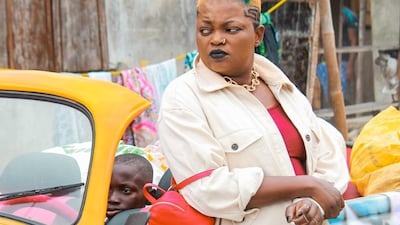First came the beats and now the movies.
With Nigerian popular music, including Afro-pop and Afro-beat, fast becoming a major sound in UAE clubs, it is now time for the country's vibrant film industry to make similar inroads into our theatres.
After years of Nigerian film screenings being viewed as either one-off events or as part of festivals, local cinemas will now host what is believed to be the first Nollywood movie to gain a general release in the UAE.
Receiving that honour from Thursday, January 21 is Omo Ghetto (The Saga), a gritty comedy featuring some of Nollywood's biggest stars.
Set mostly in Lagos and with a few scenes shot in Dubai, the film follows the changing fortunes of twin sisters Ayomide and Lefty, both played by star and co-director Funke Akindele.
Separated since childhood, the former was raised in an affluent neighbourhood, while Lefty made her living by running an all-female street gang.
Both sisters meet again when Lefty finds herself in trouble with another crew led by the sinister Mogabo.
A new kind of Nigerian story
While the film is the second of a planned trilogy, it can be watched on its own too.
However, if you have been following the series, then you know how big a deal it is for Omo Ghetto (The Saga) to receive an official premiere and release in the UAE.
Simply put, the film is a hit.
Premiering last year on Christmas Day, the film raked in NGN 429 million ($1.086m) to become one of Nigeria's highest grossing films of the year. Buoyed by the success and the critical acclaim, Akindele says it is only right to take this film on the road.
"This is a really a huge thing and very important for the industry," she tells The National.
“To see something which I put my heart and soul into be watched by different cultures really moves me. We have plans, if the pandemic allows, to take this film to the UK and US also.”
What makes it more special is the kind of story being told.
The film explores the roles of women in Nigerian society from a different perspective, with an all-star and predominantly female cast that includes Chioma Akpotha, Bimbo Thomas and Eniola Badmus as feisty street-smart characters.
"There have been stories of women empowerment in Nigerian films, but it's rare to find them discussed when its women from the ghetto," Akindele says.
“The way it works in the film is that it is the women in these streets providing shelter and safety for the men. It is my way to speak certain truths about how women are special, we exist and that we are powerful.”
It is an important message that Abdulrasheed Bello, who co-directed the film with wife Akindele, wanted seen both at home and abroad.
“As we speak right now, the film is still doing well in Nigeria and a lot of that is because, despite the comedy and fun of the script, we are telling a story that is rarely told,” he says.
"And this one is about women in charge, women in control and we have a lot of them not only here, but in Africa as well.”
A new standard for Nollywood
Another reason for film’s success, Bello says, is the relatively lavish nature of the visuals.
While not revealing the exact budget, Bello says Omo Ghetto (The Saga) is viewed in the industry as a top-tier production with figures ranging between NGN 150m ($393,000) to 200m ($525,000).
This all part of the natural evolution of Nollywood films, he explains, which moved on from its ultra-independent filmmaking roots of a decade ago. Akindele puts it down to the "Netflix effect", in that the streaming service invested heavily in commissioning and acquiring films to be shown on the platform.
With an international audience on offer and Netflix’s keen quality control when it comes to content, Nigerian investors are increasingly viewing the industry as an attractive bet.
“They are more understanding now in what we are trying to do, which is to provide entertainment to the masses and that they can make their money back,” she says.
“It is a great industry because everybody loves stories and everybody wants to be happy. There is always going to be a market for this.”
Bankole Babatunde from RCCG Events, a company specialising in bringing various African-inspired cultural events to the UAE, also senses these opportunities.
Convinced by the film's universal appeal, the Nigerian and Dubai resident instigated the move to bring Omo Ghetto (The Saga) to Dubai by facilitating discussions between the film's producers and UAE film distributor, Gulf Film.
"The story, directing and cinematography is exceptional and the people here in the UAE will see this quality immediately," he says.
"I do hope that this will be the beginning of a regular supply of Nigerian films here in UAE cinema houses. I believe that this will bring business and investment communities, not only between Nigeria and Africa at large, but with the UAE and fruitful cultural relationships as well.”
Omo Ghetto (The Saga) will release in UAE theatres onThursday, January 21


